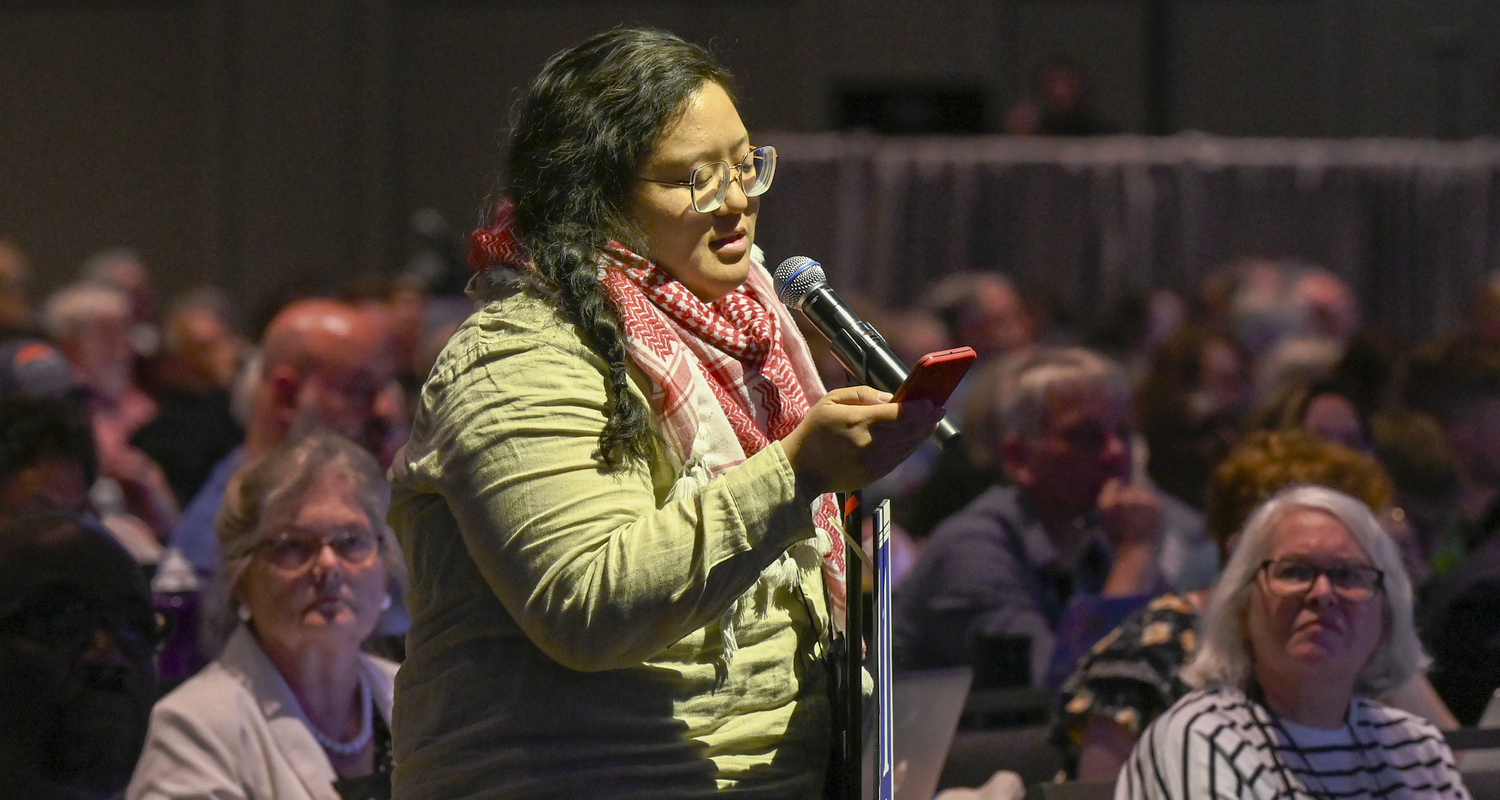.jpg)
Co-Moderator of the 226th General Assembly Cece Armstrong leads the business of the 5th plenary meeting on July 1, 2024. Photo by Kristen Gaydos
Following a joyful morning session—in which the Rev. Jihyun Oh was elected as the Stated Clerk of the General Assembly of the PC(USA) and five PC(USA)-related seminary presidents were confirmed — the fifth plenary session moved from an air of celebration to the more serious consideration of CF-18, CR-07 on Transparency of Seminaries Around Investments, which had been arrested from the morning plenary.
Teaching Elder Lucas Keppel of Eastern Oklahoma Presbytery, vice moderator of the Christian Formation Committee, explained on behalf of the committee that CF-18, if approved by the Assembly as written, has the potential to triangulate the Committee on Theological Education (COTE).
The three-part recommendation, which originally came to the committee as a Commissioners’ Resolution and was pulled from the consent agenda, would call upon the Assembly to encourage PC(USA)-related seminaries to make public their proscription list and their divestment policies. It would also encourage those without such lists or policies to consider adopting the proscription list and divestment strategy published by the General Assembly through the Committee on Mission Responsibility Through Investment (MRTI). Lastly it would direct COTE to report the seminaries’ responses to the 227th General Assembly (2026).
Speaking in favor of the motion to disapprove, YAAD Christian Smith of Northumberland Presbytery, who served on the committee, expressed a viewpoint that was later echoed by other speakers.
“Through a lot of our discussion, we agreed that transparency in divestment is important, but that this isn’t the right resolution,” he said. “We don’t have the jurisdiction to compel the seminaries to do anything.”
To help the Assembly better understand COTE’s relationship with the seminaries, its president, Teaching Elder Katherine Smith, New Hope Presbytery, explained that COTE’s mandate is “to nurture communication, relationship and shared missional work between the denomination and the independent seminaries.”
After the question was called following roughly 45 minutes of debate, the motion to disapprove passed by a vote of 297-97.
Having concluded the Christian Formation Committee’s business, the Assembly moved on to consider its actions on behalf of the Committee on Ordination, dispatching with the business quickly, approving many of its items by consensus after entertaining mostly questions and requests for clarification.
Committee Moderator Ruling Elder Laurie Warren Jones of The John Knox Presbytery began by presenting the committee’s recommendations on ORD-01, ORD-02 and ORD-03, all of which call for greater clarity surrounding “shared ministry.”
Upholding the committee’s recommendations, the Assembly approved all three overtures.
Stated Clerk the Rev. Bronwen Boswell answered Teaching Elder Louden Young’s question about how presbyteries are alerted to AIs by explaining that the stated clerk in each presbytery should look in their Annotated Book of Order when these arrive at the end of this General Assembly.
Because several items on the committee’s agenda called for referral to the Task Force to Explore the Theology and Practice of Ordination — for which the Assembly approved in ORD-08 an extension of its work until the 227th General Assembly (2026) — a member of the task force was asked to speak.

SueAnn Shiah, a theological seminary advisory delegate, address the Assembly during the 5th plenary meeting on July 1, 2024. Photo by Kristen Gaydos

Commissioners reviewed items of business from the Christian Formation, Ordination, and Financial Resources committees. Photo by Kristen Gaydos.
Teaching elder task force member Sean Chow explained that its charter is “to explore the theology and practice of ordination, including commissioned ruling elders, as well as membership, church structure, accountability, and chartering.”
The Assembly moved on to consider one item from the Financial Resources Committee. FIN-12 from the Special Offerings Review Task Force was presented to the Assembly by task force co-chairs Teaching Elder Jon Reinink and Ruling Elder Vince Patton.
Through the Presbyterian Mission Agency Board, the task force recommended several strategic shifts to the churchwide Special Offerings of the PC(USA). These recommendations are intended to allow for greater creativity, flexibility and collaboration in raising funds for mission in a cause rather than program-based model.
Its recommendations include reducing the number of Special Offerings from four to three; changing the review cycle from four years to six years to allow for the proposed Offering cycle to grow and evolve; and the creation of a grant program to support all councils.
Finding that the recommendations no longer include congregational or mid council retentions, Ruling Elder Sandra Asaro of Peace River Presbytery moved an amendment to FIN-12, item 2, calling for “a congregational option of up to 25% of each collection amount” to remain at the local level.
As articulated by several commissioners, the issue revolves around congregations’ ability to keep a “guaranteed” portion of the Offerings whereas a grant — in the proposed grant program model — would not be guaranteed.
After the motion to amend was approved by a vote of 208-207, a motion to reconsider was proposed after the Assembly learned that a commissioner had been out of the room when the original vote was taken.
Speaking in favor of reconsidering, YAAD Mairead Brock of Western North Carolina Presbytery, said “it’s important to redo the vote; every vote counts.” Following the approval of the motion to reconsider by a margin of 317-100, the amendment failed by a vote of 208-215. FIN-12, as originally presented, was then approved by a vote of 353-73.
The plenary closed with a presentation by the Rev. Wilson Kennedy, associate director for Special Offerings and Appeals for the PC(USA), highlighting 75 years of One Great Hour of Sharing.
